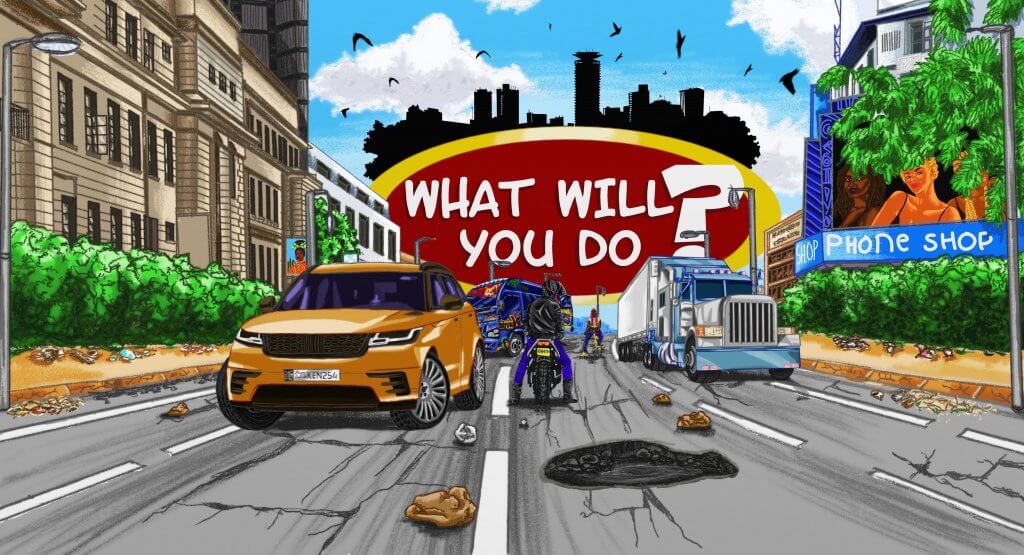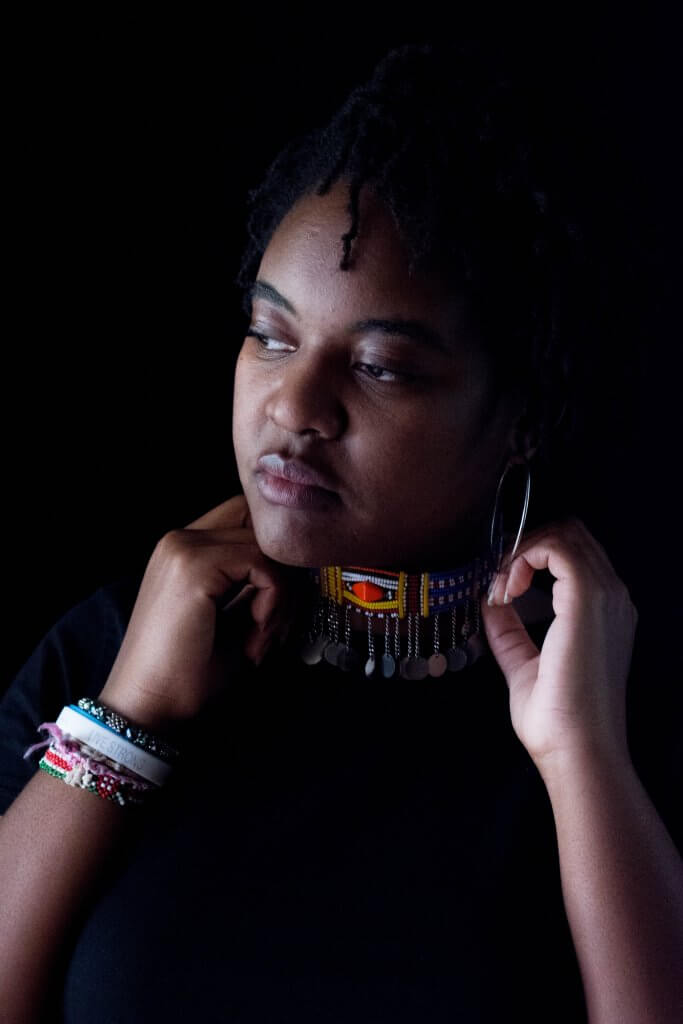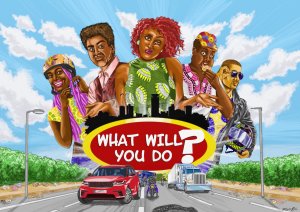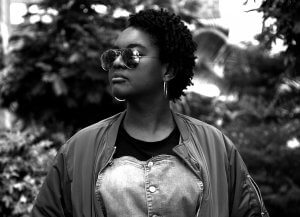If you’ve encountered Kemoli’s work as an artist before, you’ll find that her art is a pure, powerful alignment with nature and a showcase of women in that element of power. Her drawings and paintings reflect the queen in women, using bold colors to hone in on the features that stand out.
Now, she has brought her talent into game development and has created a board game that combines road safety enlightenment with colorful gaming.
An artist and educational board game developer from Nairobi, Kenya. Mijide Kemoli, is an illustrator, graphics facilitator and founder of Keeke Art, Mijide Kemoli holds a Master of Arts degree in Illustration from the University of Portsmouth, the U.K, and a Bachelor of Arts degree in Design from the University of Nairobi, Kenya.

illustration via Keeke Art
The recent pandemic can be viewed as a blessing and a curse, it was definitely a blessing to Mijide whose love for board games led her to develop her own game called “What Will You Do?”, a fun and educative game that helps players to gain road safety education and also have fun when playing.

image by 92K Photography
Fascinating to have you back on our platform, Mijide. We are glad to have you. Can you tell us a bit about yourself, your background, occupation, hobbies, etc.?
Thank you so much for the opportunity. It is an honor to be featured once again and share my story through your platform.
Well, as you’ve mentioned, my name is Mijide, a name I inherited from my late grandmother, who was a strong, courageous woman who overcame so many challenges in her life. I seek to embody that spirit in what I do each day, which is why I use the name in my professional endeavours. Plus, it’s super unique.
Since I was a young child, I have always loved art and expressing myself creatively. It happened to be something that came very naturally to me from a tender age, so whenever I watched cartoons or looked at children’s books, I would always try to trace the characters on a separate paper and add my twist to them. Funny enough, I even knew way back then that I wanted to be an illustrator when I grew up. An illustrator and author, to be more specific. To prepare myself for this path, I would try and write my own children’s stories at six years old, and over the years, I kept writing and kept drawing, and each year, I would get better and better at it. My teachers and parents soon noticed this hidden talent I had and continued to nurture it as I aged. This led to me taking Arts and Design as one of my main subjects from primary school to high school. I then pursued a degree in the same and finally specialized in Illustration for my master’s, and I couldn’t be more grateful for the chance to study something I feel I was born to do.
In addition to illustrating and writing, I love music! Whenever I am creating work, you’ll always find me doing so while listening to my favorite jams. Because of this, I have the lyrics to so many songs locked in a vault in my mind. Even if I haven’t heard a song in years, as soon as it plays, the lyrics all rush back to mind. My love for music has also led to me developing a love for dance and singing. I hosted a few online karaoke nights with a friend of mine during this pandemic period, and it was such a fun experience! That’s me in a nutshell.
When did your interest in board games develop?
I have always found board games rather intriguing, but the inspiration to create my own was born three years ago while studying for my master’s degree. I wanted to challenge myself creatively when I was thinking of a project. During this reflective period, I recalled a memory from a few years before I was walking with my mum on a Nairobi street as a teenager. We saw a reckless driver speeding past, and I asked her why people drive as if they are in some sort of game and win a prize at the end. After that, when I joined university, I did some volunteer work for a local road safety NGO and got to learn a lot more about road safety through trainings and workshops. It was a combination of these two experiences that allowed the idea of creating a board game to be born years later. Once I created the first copy, my love for board game development grew from there.
How do you handle being an artist, illustrator, and game developer?
Thankfully, I get to combine all of these in the game development work that I do. In addition to being games that people can play for enjoyment while learning something along the way, I like to consider the board games I create as works of art. This is expressed through the appearance of the characters, their outfits, and the environments I build. Moreover, as an illustrator, I create a visual story using the characters and scenes that I have made, ensuring that all come together to form a product that people will enjoy visually as they play.
Has the transition from painting to developing board games affected you in any way?
It was quite the transition. For most of my younger years, I was accustomed to creating my work on paper using pencils, crayons, or paint. As the years went by, I became better and better at this and imagined that even when I became an illustrator like I always dreamed, I would continue to use the same tools to create my work.
It was only later on, when I pursued my further studies, that I realised there was so much more that I could do with my creative ability and still have an impact on people through the same. Now that I have chosen to focus on board game development using digital tools, I have come to discover that I can still make a change, and I can still have an impact while remaining creative. I am just doing so in a different way. At first, it was a daunting experience since I didn’t know how designing a game could help anybody, but now, it is a transition that I have come to embrace with open arms.
How many games have you created so far, and how many are in distribution?
At the moment, there is one main signature board game under Keeke Art called What Will You Do? My intention for this board game is to provide players with a memorable experience through game sessions as opposed to selling it, so it is currently not for sale. I came up with this idea after reading the story of Elizabeth Magie, the original, less-spoken-about inventor of the Monopoly board game. According to sources, her intention for the game was to “protest against the big monopolists of her time” (NY Times, 2015). This aim was lost once the game was commercialized and popularized with Charles Darrow becoming the new face of it. I would want WWYD? to retain the main intention I have for it which is to educate audiences on road safety in a fun way through gameplay and open discussion in a relaxed environment, and I feel that selling it commercially may end up leading to it losing that purpose.
What socio-economic issue do you think your game can affect positively?
That is a great question. The beauty about games is that they can be used as a tool to educate audiences on a vast array of socio-economic issues in an interactive and engaging manner and WWYD? is no different. My main hope for the game is that even as players enjoy the process of playing it, it encourages them to think twice before they intentionally make a blunder on the road that could affect not only themselves but those around them. Road safety education is the main area of focus for Keeke Art’s signature game and witnessing a positive change in the attitude of road users that have the chance to play the game would be a huge win.
Where do you draw the inspiration/creativity to develop these games from?
I draw a lot of inspiration from the music I listen to and the music videos that some of my favorite artists, both locally and internationally, have created. I observe how colour, clothing and make-up come together to create a beautiful aesthetic, and I try to accomplish the same in my work.
I also feel inspired by the people that I encounter on the street and their peculiar habits and the lifestyle of people and their unique culture in the countries outside Kenya that I have had the pleasure of visiting. For example, back in 2019, I got the chance to travel to New York for a leadership programme, and while I was there, I visited an arts centre and attended an exhibition there and a dance performance. All of it was mind-blowing! Seeing how creative minds were breaking barriers and transporting viewers to another world using their art pushed me to elevate my work to another level and challenge myself even more to achieve my best work.

illustration via Keeke Art
While going through your website, I was intrigued by What Will You Do. It’s a blend of the traditional Whodunit mysteries with a sprinkle of Monopoly set in the modern-day fast-paced African city setting. I love the vibe, it’s fresh, engaging, and innovative. How did you come up with the game, rules, and instructions?
Wow, thank you so much! Well, once I decided to design the board game, I did some research on games that I had played in the past (including Monopoly) to gain some inspiration. Once I had some ideas going, I would sketch them out in a journal that I dedicated to developing my game. I also conducted some surveys in my community to learn more about the real-life experiences that people have had on the road and combined those with my own personal experiences.
Once I did that, I employed my writing skills to make the content more interesting and make the gameplay more engaging. I tend to think visually very easily so I would picture how the game would look and how it would work in my mind and made sure to jot that down as fast as possible before I forgot.
At that point, I began building more refined sketches and drawing out the characters so that the appearance of the game would become clearer. When all this was complete, I built the prototype and had different people play the game and provide their feedback, allowing me to keep improving the game until I created the final version. (Fun fact: it took 5 prototypes to reach the result that I am now completely satisfied with).
You’re on a roll! I noticed you have a new game coming soon, what should we expect from this new game?
Thank you very much! Yes, you are correct. I have a new card game that I intend to release this year that stems from the main board game. This should be available for purchase mid-year at the latest. I hope to build a series of 108-card games with a similar concept to the main WWYD? board game but much friendlier on the pocket. The first in this series will be What Will You Do?: Route 11, which will be focused on the adventurous experiences of pedestrians in Nairobi city. The concept of collecting tokens will be maintained in this new game, and hopefully, eventually, I may release collector’s cards for the game characters. That may add an interesting twist to it, like what was done with Pokemon and Dragonball Z back in the day.
What challenges do you experience as a game developer and entrepreneur?
Hmm…well, the first would probably be having people catch on to the idea of using games as a tool to educate audiences on various issues, especially in my local setting since this is not common in the slightest. The creative arts has been a deeply undervalued field of expertise in Kenya, especially since it is not a professional route that most are expected to take. Coincidentally, that has also been a blessing in disguise because it allows me to introduce something new to my community and contribute to the growth and appreciation of audiences in this area within the creative industry. People’s perceptions of what we do as creatives can always be changed, but we have to be the ones that convince them to think of what we do differently by valuing our work more and persuading others to do the same. That way, we will be setting a better foundation for the next generation of creatives that will follow.
Another challenge I encountered a lot, especially when I was developing my first game, is the problem that plagues a lot of creative professionals…perfectionism. I would find myself wanting my work to be perfect, and as a result, I would hold myself back from opportunities to grow through sharing my work, feeling that it was not good enough yet to present to others. I am learning to overcome that now and am more confident in the work I do and the products that I produce. It is such a liberating feeling.
Finally, as an entrepreneur, there are those occasional concerns you sometimes have when the job flow is not as steady as you would like and you wonder whether you should throw in the towel and just get a regular job with a steady paycheck. This has crossed my mind several times, but I am grateful to have family and friends around me that have been a constant support system, encouraging me to keep going and stay motivated because the hard work will pay off eventually. I thank God that these words have stood true, and I am experiencing a lot of growth and opportunity as the months go by. Now, I can’t imagine doing anything else.

image by 92K Photography
Which do you prefer the most? Being an artist or a game developer, and why?
There is a beauty I find in both. Art creation has allowed me to meet amazing new people, earn money and travel abroad so it will always be my first love.
At the moment though, I have come to thoroughly enjoy the process of game creation and being able to combine aspects of art with fashion design, illustration, writing and storytelling to make unique and fun games.
Despite this, whenever I have free time and am feeling some creative juices flowing, I will sit down and paint something to express that creativity. Plus, it’s always a great way to start conversations with people. There is always a sense of intrigue that audiences have when they see a product that someone else has created and the talks that they spark can be very eye-opening as well.
How have people been receptive to your game?
The response has been overwhelmingly positive. I have been able to have people play the game in different countries from different races and backgrounds, and I am thankful that the feedback has been mostly positive. Players were able to understand the game concept even if they weren’t Kenyans themselves and even contributed to the improvement of it through their helpful critique. I am so thankful to everyone that has tested the game over the years and taken the time to help me build towards the final copy that we have now. Their contribution has been golden.
What is your biggest goal at the moment for Keeke Art?
For the business to keep growing steadily and work on and complete 3 games for clients and 1 game for the business in a year. That way, I can keep improving on my craft and yet, still grow the business through what the game development projects would have earned it. Oh, and I also hope to have my first game session once the pandemic is under control and bringing people together is no longer a health hazard as it is now. I hope to have about 12 players in my first session and build up from there…
I also hope for Keeke Art to be an inspiration for other creatives out there to keep being bold in the work that they do and continue to think outside of the box to inspire people around the world and make tangible change. There are few board games out there that are based in African settings and paint its characters in a beautiful light, so that is what I hope to continue to tap into. I want to tell the story of our local scenarios in a beautiful, captivating way.
Oops, those were about three goals. The biggest one is growing the business for sure.
What does your daily life seem like?
My daily life is pretty similar each day. I work from home, so I have to be disciplined, especially when it comes to how I allocate my time. I try to sleep and wake up at the same time each day and have breakfast and freshen up. Thereafter, I begin working and dedicate approximately 7 hours to the work I do, excluding my 1 hour lunch break. I do my best to get up and move around each hour as well so that I don’t find myself falling into the unhealthy habit of remaining seated for hours on end. I also make a point to get a workout at least 4 times a week during late afternoon hours.
Once evening comes around, I switch off my computer so that I am not tempted to continue working. This timetable has allowed me to have a better work/life balance. I do not work on weekends, so I take that time to hang out with friends and family or have some me-time, which is so crucial I have come to learn. It is through the time I have been taking to myself that I have gotten to learn more about me and what I truly want and hope to achieve in my life. I also catch up on some of my favorite shows on Netflix during this time.
We wish you the best, Mijide.
Thank you so much! I am truly humbled and grateful.





